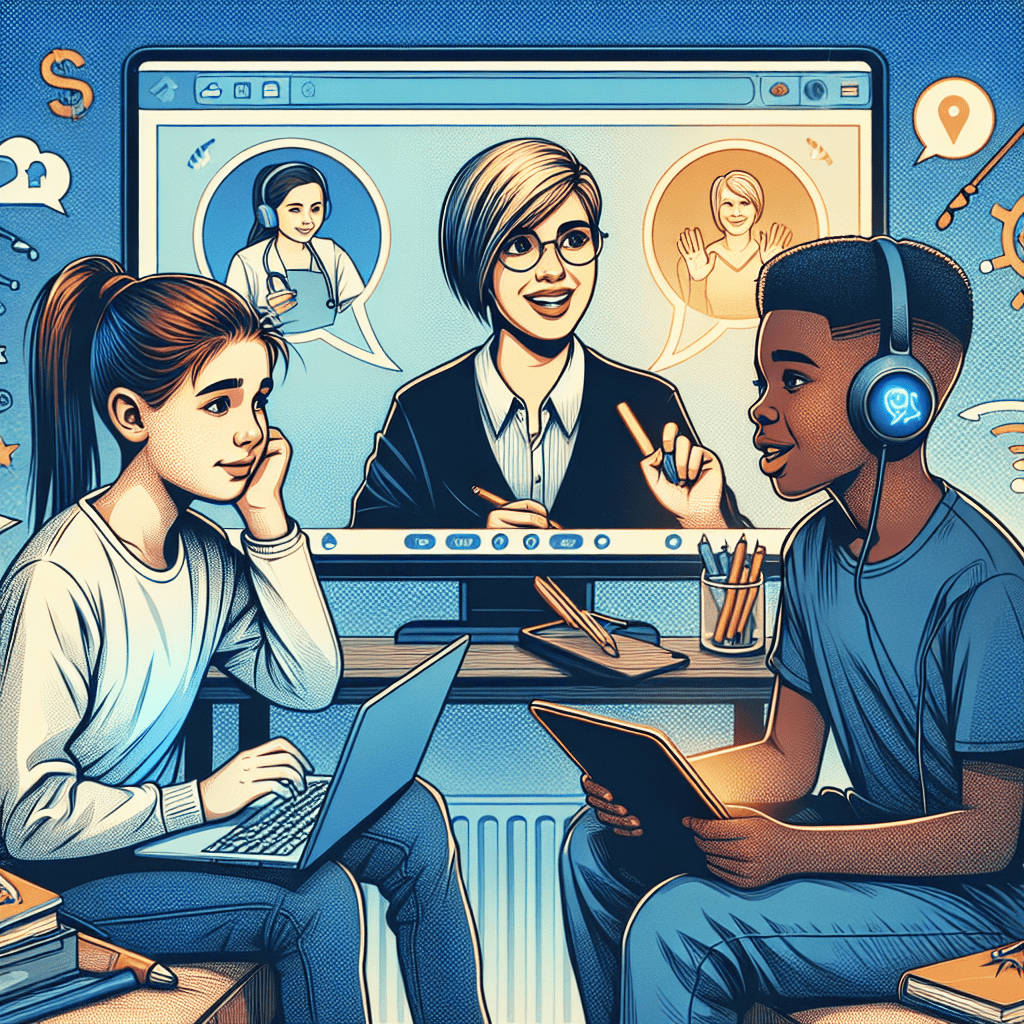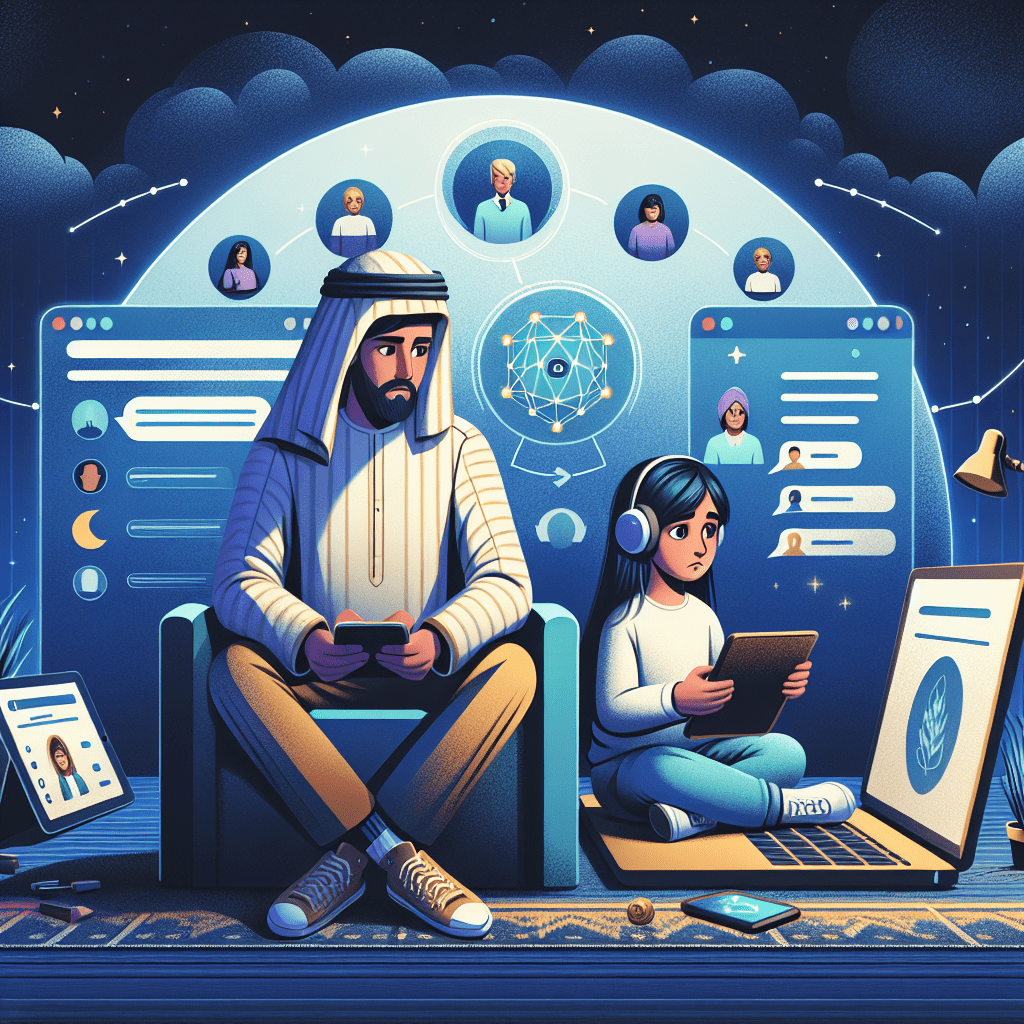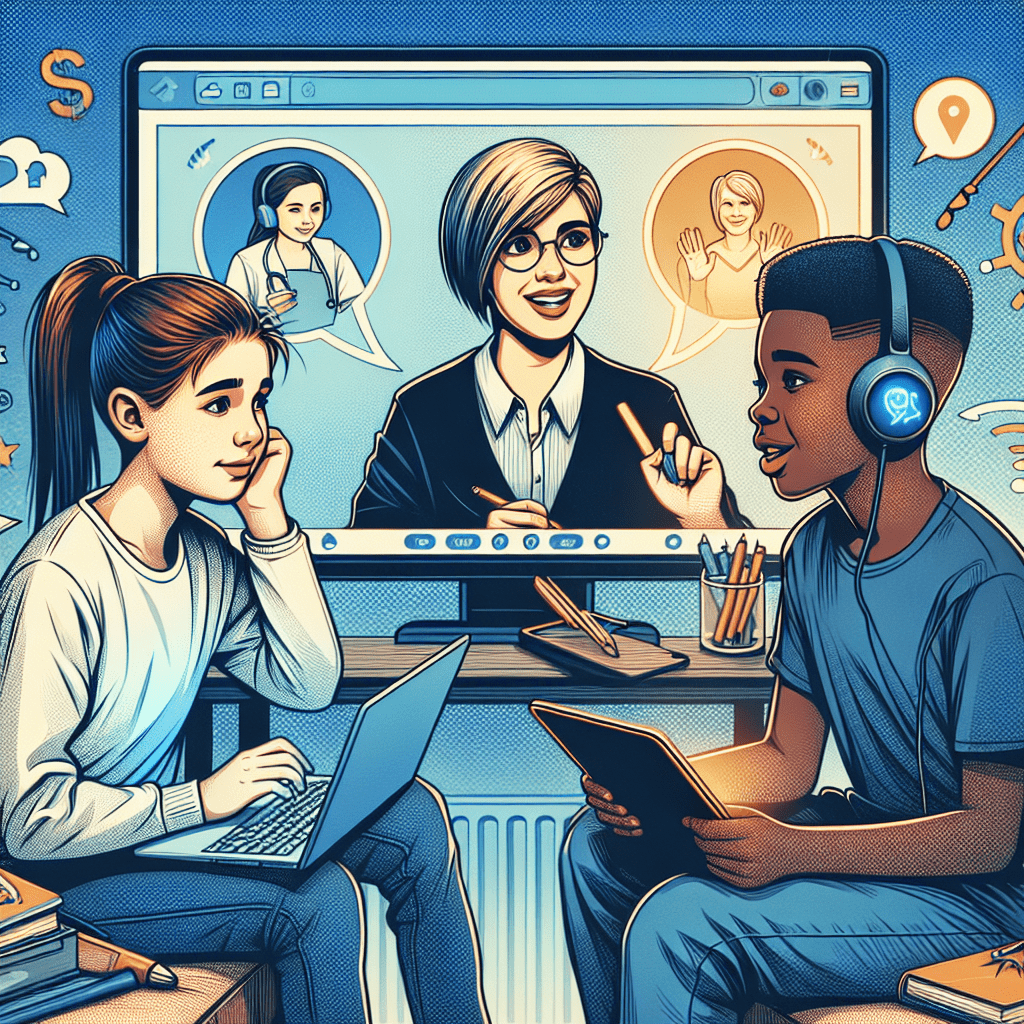Have you ever wondered if online therapy is a viable option for children and teenagers? With the increasing reliance on technology in our lives, it’s no surprise that the field of therapy has also ventured into the digital realm. But can online therapy effectively address the unique needs and challenges faced by young individuals? In this article, we explore the potential benefits and limitations of online therapy for children and teenagers, shedding light on whether it can truly be a valuable tool in their mental health journey.

Benefits of Online Therapy for Children and Teenagers
Convenience and Accessibility
One of the major advantages of online therapy for children and teenagers is the convenience and accessibility it offers. Traditional therapy often requires making appointments, traveling to a therapist’s office, and fitting sessions into already busy schedules. With online therapy, all that is needed is an internet connection, and therapy can be accessed from the comfort of home. This eliminates the need for transportation and allows for more flexibility in scheduling sessions. Whether a child or teen is dealing with school-related stress, anxiety, or other mental health issues, online therapy provides a convenient solution that can easily fit into their daily routine.
Comfort and Familiarity
For children and teenagers, the familiar and comfortable environment of their own home can be beneficial during therapy sessions. Being in a familiar setting can help them feel more relaxed and at ease, making it easier to open up and share their thoughts and feelings. The comfort of their own space can also lead to a higher level of engagement with the therapy process. Additionally, some children and teenagers may find it less intimidating to communicate their emotions and concerns through technology rather than face-to-face interactions.
Reduced Stigma and Embarrassment
Online therapy can help reduce the stigma and embarrassment that may be associated with seeking help for mental health issues. Some children and teenagers may feel hesitant or ashamed to go to a physical therapy office due to concerns about being seen by others or being judged. Online therapy allows them to receive the support they need without these worries. It also provides a level of anonymity that can make it easier for children and teenagers to discuss sensitive topics without fear of judgment or negative consequences.
Challenges and Concerns
Limited Nonverbal Communication
One challenge of online therapy for children and teenagers is the potential limitation of nonverbal communication. In face-to-face therapy, therapists can observe nonverbal cues such as body language, facial expressions, and tone of voice, which can provide valuable insights into a child’s or teenager’s emotional state. However, in an online setting, some of these cues may be less visible or distorted, making it challenging for therapists to fully understand and interpret their client’s emotions. Therapists who use online therapy may need to rely more on verbal communication and actively encourage clients to express their feelings in words.
Potential Technical Difficulties
Another concern with online therapy is the potential for technical difficulties. Internet connection issues, lag in video or audio, and other technical problems can disrupt the flow of therapy sessions and hinder effective communication between the therapist and the child or teenager. It is important for both the therapist and the client to have a reliable internet connection and a backup plan in case of technical issues. Therapists should also be prepared to troubleshoot and adapt to these challenges to ensure the continuity of therapy.
Parental Involvement and Supervision
Online therapy may require increased parental involvement and supervision compared to traditional therapy. Depending on the age of the child or teenager, parents may need to be present during the therapy sessions to provide support and ensure their child’s safety. Parents may also need to assist with technology setup and troubleshooting. While parental involvement can be beneficial, it is important for therapists to establish clear boundaries and maintain the confidentiality of the therapy process. Open and ongoing communication between the therapist, the child or teenager, and the parents is crucial to ensure effective therapy outcomes.
Effectiveness of Online Therapy for Children and Teenagers
Research and Studies
Numerous studies have explored the effectiveness of online therapy for children and teenagers, and the results have been promising. Research has found that online therapy can be just as effective as traditional therapy in treating a wide range of mental health issues, including anxiety, depression, and behavioral problems. For example, a study published in the Journal of Medical Internet Research found that online cognitive-behavioral therapy was effective in reducing symptoms of anxiety and depression in children and adolescents. These findings support the growing body of evidence that online therapy is a viable and effective treatment option for young individuals.
Comparison with Traditional Therapy
When comparing online therapy with traditional therapy, there are several factors to consider. Online therapy eliminates geographical barriers, allowing children and teenagers to access therapy services regardless of their location. It also provides a level of convenience and flexibility that may not be achievable with traditional therapy. Additionally, online therapy has been shown to be particularly effective for individuals who are more comfortable with technology or who have difficulty opening up in face-to-face settings. However, it is important to note that some individuals may still prefer and benefit more from traditional therapy, depending on their specific needs and preferences.
Client Satisfaction and Outcomes
Client satisfaction and outcomes are important indicators of the effectiveness of online therapy for children and teenagers. Numerous anecdotal reports and surveys have shown high levels of client satisfaction with online therapy, with many individuals reporting positive experiences and improvements in their mental health. Online therapy has been praised for its convenience, accessibility, and ability to foster a strong therapeutic relationship. While each individual’s experience may vary, the overall satisfaction rates and positive outcomes suggest that online therapy can be a valuable and effective treatment option for children and teenagers.

Types of Online Therapy Approaches
Chat-based Therapy
Chat-based therapy involves text-based communication between the therapist and the child or teenager. This approach allows for asynchronous communication, meaning that clients can send messages and receive responses at their convenience. Chat-based therapy can be beneficial for individuals who feel more comfortable expressing themselves in writing or who prefer a less immediate form of communication. It also allows for a written record of the therapy conversations, which can be helpful for reviewing progress and reflecting on previous sessions.
Video Conferencing Therapy
Video conferencing therapy, also known as teleconferencing or video therapy, involves real-time, face-to-face communication between the therapist and the child or teenager. This approach aims to replicate the experience of in-person therapy as closely as possible. Video conferencing therapy allows for visual and auditory cues, which can enhance the therapeutic process by providing a more comprehensive understanding of the client’s emotions and nonverbal communication. It also allows for more immediate feedback and interaction, creating a sense of presence and connection between the therapist and the client.
Virtual Reality Therapy
Virtual reality therapy is a cutting-edge approach that uses virtual reality technology to create immersive and interactive therapeutic experiences. This type of therapy can be particularly beneficial for children and teenagers who struggle with anxiety, phobias, or trauma-related issues. By exposing the client to virtual environments that replicate real-life situations, virtual reality therapy provides a safe and controlled space for gradual exposure and desensitization. It can help individuals overcome their fears and develop coping strategies in a realistic and engaging manner.
Adapting Online Therapy for Different Age Groups
Preschool-Aged Children
When providing online therapy for preschool-aged children, therapists need to adapt their approach to suit their developmental stage and capabilities. This may involve incorporating play therapy techniques, using visual aids or props, and utilizing interactive games or activities through video conferencing or virtual platforms. Therapists may also need to involve parents or caregivers in the therapy process and provide them with guidance on how to support their child’s emotional well-being at home.
School-Aged Children
For school-aged children, online therapy can be tailored to their cognitive abilities and interests. Therapists can employ various techniques such as cognitive-behavioral therapy, art therapy, or storytelling to engage children in the therapeutic process. They can also utilize technology and online resources, such as interactive worksheets or educational games, to enhance the effectiveness of therapy sessions. Collaborating with parents and teachers to reinforce therapeutic strategies in the child’s daily life can further support positive outcomes.
Teenagers
Online therapy for teenagers can be approached similarly to therapy for adults, as they often possess the cognitive and emotional maturity to engage in more in-depth discussions. Therapists can focus on helping teenagers develop coping skills, explore their identity, manage stress and anxiety, and navigate the challenges of adolescence. Incorporating technology, such as mobile apps or online journaling platforms, can also appeal to teenagers and facilitate their active participation in therapy.
Legal and Ethical Considerations
Informed Consent and Confidentiality
Informed consent is a crucial aspect of online therapy for children and teenagers. Before beginning therapy, both the client and the parent or guardian should be thoroughly informed about the benefits, limitations, and potential risks of online therapy. This includes discussing issues of privacy, security, and confidentiality. Therapists must obtain consent from both the client and the parent or guardian to ensure that everyone is aware of their rights and responsibilities. Protecting the client’s confidentiality and adhering to legal and ethical guidelines are essential elements of the online therapy process.
Licensing and Jurisdictional Issues
Therapists providing online therapy for children and teenagers must ensure they are appropriately licensed and comply with the relevant professional regulations and jurisdictional requirements. Different states or countries may have varying laws and regulations regarding the practice of online therapy, and therapists should be familiar with and adhere to these guidelines. Therapists should also consider obtaining professional liability insurance that covers online practice to ensure they are adequately protected.
Child Protection and Safety Measures
Safeguarding the well-being and safety of children and teenagers during online therapy is of utmost importance. Therapists should implement safety measures, such as using secure and encrypted platforms, verifying the identity of clients, and setting clear boundaries and expectations for appropriate online behavior. They should also have protocols in place for reporting and responding to any concerns of child abuse or neglect. Collaborating with parents, caregivers, and other professionals involved in the child’s life can further enhance child protection and support overall therapeutic progress.
Tips for Parents and Caregivers
Research and Select a Reputable Provider
When considering online therapy for their children or teenagers, parents and caregivers should research and select a reputable provider. It is important to choose a licensed and experienced therapist who specializes in child and adolescent therapy. Reading reviews, seeking recommendations, and conducting interviews can help parents make an informed decision and feel confident in their choice of therapist. Additionally, ensuring that the online therapy platform used is secure and privacy-focused is essential for protecting the child’s confidentiality and personal information.
Create a Suitable Therapy Environment
Creating a suitable therapy environment at home is crucial in facilitating productive and comfortable online therapy sessions. Parents and caregivers should ensure that the child or teenager has a quiet and private space where they can freely express themselves without distractions. It may be helpful to provide a comfortable chair, good lighting, and any necessary materials, such as art supplies or toys, depending on the child’s age and therapy approach. Minimizing interruptions and ensuring a reliable internet connection are also important factors in creating an optimal therapy environment.
Establish Open Communication and Trust with the Therapist
Establishing open communication and trust with the therapist is vital for a successful online therapy experience. Parents and caregivers should encourage their child or teenager to share their thoughts and feelings with the therapist and emphasize that the therapy sessions are a safe space for expressing themselves without judgment. Regular discussions with both the child and the therapist can help identify any concerns or challenges and ensure that the therapy goals and progress are in alignment with the child’s needs. Active involvement and follow-up by parents and caregivers can strengthen the therapeutic alliance and support the child’s overall well-being.
Training and Credentials for Online Therapists
Education and Qualifications
Online therapists working with children and teenagers should have the necessary education and qualifications to provide quality mental health services. They should hold a degree in psychology, counseling, social work, or a related field from an accredited institution. Additionally, therapists should possess the appropriate licensure or certification to practice psychotherapy in their respective jurisdiction. Specialized training or experience in child and adolescent therapy is highly recommended to ensure therapists have the knowledge and skills needed to effectively work with this population.
Specialized Training for Child and Adolescent Therapy
To enhance their expertise in child and adolescent therapy, online therapists can pursue specialized training programs or certifications. These programs often cover topics such as child development, play therapy techniques, trauma-informed care, and evidence-based interventions for specific mental health conditions commonly experienced by children and teenagers. Participating in continuing education courses or workshops can also help therapists stay up to date with the latest research and best practices in the field of child and adolescent therapy.
Ongoing Professional Development
Continuing professional development is essential for online therapists to stay current and continually improve their skills and knowledge. Engaging in regular supervision or consultation with experienced professionals can provide therapists with valuable feedback and support. Joining professional organizations or online therapy networks enables therapists to connect with peers, share insights, and engage in discussions about best practices and emerging trends. Actively seeking opportunities for learning and growth demonstrates a commitment to providing high-quality care to children and teenagers through online therapy.
Conclusion
The growing role of online therapy in providing support for children and teenagers is evident in the numerous benefits it offers. From convenience and accessibility to reduced stigma and embarrassment, online therapy provides a flexible and effective way for young individuals to receive the necessary mental health support. While challenges and concerns exist, such as limited nonverbal communication and potential technical difficulties, research and client satisfaction indicate that online therapy can be a valuable treatment option. The diverse approaches available, such as chat-based therapy, video conferencing therapy, and virtual reality therapy, cater to the unique needs of children and teenagers at different developmental stages. Adapting therapy techniques and strategies for different age groups ensures that online therapy is tailored to meet their specific needs and promote positive outcomes. Legal and ethical considerations, including informed consent, licensing, and child protection, must be taken into account to ensure the safety and well-being of young clients. Parents and caregivers play a crucial role in supporting their children during online therapy, and establishing a suitable therapy environment and open communication with the therapist are essential. Online therapists themselves should possess the required training, credentials, and ongoing professional development to provide high-quality care to children and teenagers. As the landscape of therapy continues to evolve, it is essential to consider the various facets of online therapy implementation and explore future directions and advancements in the field. With careful consideration and implementation, online therapy can continue to expand its role in supporting the mental health and well-being of children and teenagers.

